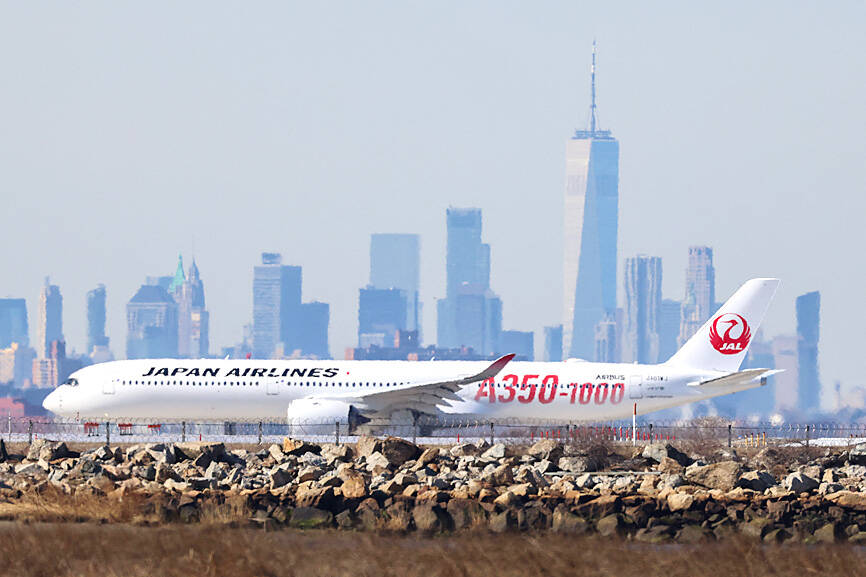Airbus SE has secured two major orders from the flagship carriers of Japan and South Korea, giving the European manufacturer a strategic win in markets that have traditionally leaned toward archrival Boeing Co.
Japan Airlines Co said it is buying 21 Airbus 350-900 as well as 11 A321neos, breaking Boeing’s exclusive hold as the sole single-aisle jet supplier for the carrier. Boeing brought home a smaller deal, for 10 Boeing 787 wide-body jets.
Two hours later, Korean Air Lines Co announced the purchase of 33 Airbus A350 jets in a winner-takes-all contest that left Boeing empty-handed.

Photo: AFP
The commercial successes would help Airbus deepen relations with two carriers that for decades built the bulk of their fleets around the US manufacturer.
Boeing has been in crisis for several months following a near-catastrophic accident on a 737 Max 9 model in early January. Nevertheless, the carrier has managed to log several big orders since then, and loyal carriers such as Ryanair Holdings PLC have pledged their support to the US company as it seeks to improve its manufacturing processes.
This year is shaping up to be buoyant for wide-body aircraft orders, with Qatar Airways QCSC seeking to purchase as many as 150 twin-aisle jets. Cathay Pacific Airways Ltd (國泰航空) in Hong Kong is also considering a sizeable deal involving dozens of mid-sized wide-body jets. There are also big narrow-body orders on the horizon with Cebu Air Inc looking to close out an order for as many as 150 planes.
Korean Air mostly ordered the larger variant of Airbus’ A350 wide-body model. Of the almost 160 planes in Korean Air’s fleet, 65 percent are from Boeing. The carrier still has about 60 Boeing jets on backlog and about 75 with Airbus after its latest order announcement.
Japan Airlines has about 155 Boeing jets in its fleet with just 17 Airbus jets, the company’s latest financial presentation showed.
Demand for larger jets and bulk buying, bullish bets on future travel growth and strains on plane makers’ ability to meet demand for single-aisle aircraft this decade is fueling a surge in wide-body orders over the past 12 months.
Last year saw a series of bumper orders including an order for 90 777X jets from Emirates Airline and 50 from United Airlines Holdings Inc for the 787-9.
Airbus scored big with 70 wide-body jets out of 220 ordered by Turkish Airlines among other deals. Thai Airways International PCL unveiled an order for 45 787 Dreamliners at the Singapore Airshow last month, having agreed on the deal in December last year.
Both plane makers anticipate that the Asia-Pacific region would account for 40 percent of global air traffic in two decades, up from one-third, according to their long-term projections.

Intel Corp chief executive officer Lip-Bu Tan (陳立武) is expected to meet with Taiwanese suppliers next month in conjunction with the opening of the Computex Taipei trade show, supply chain sources said on Monday. The visit, the first for Tan to Taiwan since assuming his new post last month, would be aimed at enhancing Intel’s ties with suppliers in Taiwan as he attempts to help turn around the struggling US chipmaker, the sources said. Tan is to hold a banquet to celebrate Intel’s 40-year presence in Taiwan before Computex opens on May 20 and invite dozens of Taiwanese suppliers to exchange views

Application-specific integrated circuit designer Faraday Technology Corp (智原) yesterday said that although revenue this quarter would decline 30 percent from last quarter, it retained its full-year forecast of revenue growth of 100 percent. The company attributed the quarterly drop to a slowdown in customers’ production of chips using Faraday’s advanced packaging technology. The company is still confident about its revenue growth this year, given its strong “design-win” — or the projects it won to help customers design their chips, Faraday president Steve Wang (王國雍) told an online earnings conference. “The design-win this year is better than we expected. We believe we will win

Chizuko Kimura has become the first female sushi chef in the world to win a Michelin star, fulfilling a promise she made to her dying husband to continue his legacy. The 54-year-old Japanese chef regained the Michelin star her late husband, Shunei Kimura, won three years ago for their Sushi Shunei restaurant in Paris. For Shunei Kimura, the star was a dream come true. However, the joy was short-lived. He died from cancer just three months later in June 2022. He was 65. The following year, the restaurant in the heart of Montmartre lost its star rating. Chizuko Kimura insisted that the new star is still down

While China’s leaders use their economic and political might to fight US President Donald Trump’s trade war “to the end,” its army of social media soldiers are embarking on a more humorous campaign online. Trump’s tariff blitz has seen Washington and Beijing impose eye-watering duties on imports from the other, fanning a standoff between the economic superpowers that has sparked global recession fears and sent markets into a tailspin. Trump says his policy is a response to years of being “ripped off” by other countries and aims to bring manufacturing to the US, forcing companies to employ US workers. However, China’s online warriors